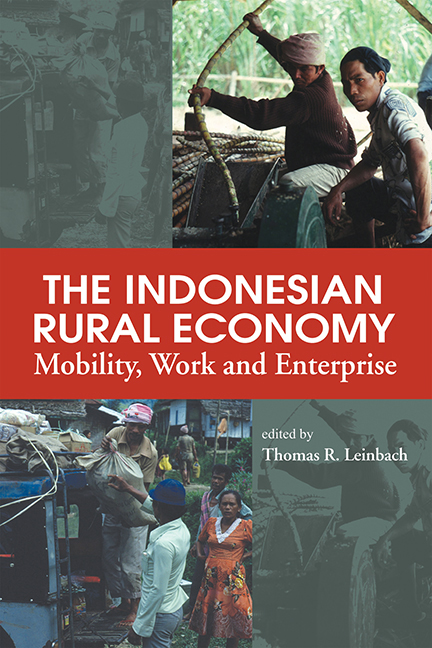Book contents
- Frontmatter
- Content
- List of Tables
- List of Figures
- Contributors
- Acknowledgements
- Glossary
- Foreword
- Part I The Development Context
- Part II Entrepreneurship, Gender and Mobility Issues
- Part III Indonesia's Rural Non-Farm Economy: Case Studies and Policy Development
- Chapter 9 Small Enterprises, Fungibility and South Sumatran Transmigration Livelihood Strategies
- Chapter 10 Transitions to Non-Farm Employment and the Growth of the Rattan Industry: The Example of Desa Buyut, Cirebon
- Chapter 11 Policy Implications for RNFEs: Lessons from the PARUL Project in Indonesia
- Chapter 12 The Indonesian Rural Economy: Insights and Prospects
- Index
Chapter 10 - Transitions to Non-Farm Employment and the Growth of the Rattan Industry: The Example of Desa Buyut, Cirebon
from Part III - Indonesia's Rural Non-Farm Economy: Case Studies and Policy Development
Published online by Cambridge University Press: 21 October 2015
- Frontmatter
- Content
- List of Tables
- List of Figures
- Contributors
- Acknowledgements
- Glossary
- Foreword
- Part I The Development Context
- Part II Entrepreneurship, Gender and Mobility Issues
- Part III Indonesia's Rural Non-Farm Economy: Case Studies and Policy Development
- Chapter 9 Small Enterprises, Fungibility and South Sumatran Transmigration Livelihood Strategies
- Chapter 10 Transitions to Non-Farm Employment and the Growth of the Rattan Industry: The Example of Desa Buyut, Cirebon
- Chapter 11 Policy Implications for RNFEs: Lessons from the PARUL Project in Indonesia
- Chapter 12 The Indonesian Rural Economy: Insights and Prospects
- Index
Summary
Introduction
Towards the end of year 2000, a group of researchers from the Social Monitoring and Early Response Unit (SMERU) Research Institute in Jakarta conducted a study of small-scale rural credit in a number of villages traditionally associated with wet-rice cultivation in the Cirebon area of West Java. In one of these villages, Buyut in Kecamatan Cirebon Utara, our team was struck by the dynamic economic environment within the local community. Throughout the day there was little evidence of young people chatting idly with nothing to do—a common indication of unemployment in many other village communities throughout Java. Every morning a number of vehicles collected young men and women from the village, and returned them in the evening from their work in the rattan industry. Some of those returning home carried rattan from their places of employment, apparently as models for making additional items in their own homes. At the same time, in houses throughout the village, many of the occupants—old and young, male and female—were busily occupied with rattan work. It was apparent that in Buyut, and possibly in other villages nearby, the rattan industry had become a mainstay for those people looking to obtain additional income outside the parameters of the traditional agricultural economy.
Fieldwork for this study was carried out in September 2001. The research team observed and recorded the economic activities of the village community in Buyut, and especially those associated with the rattan industry. The study aimed to concentrate on the following three areas: to examine the impact of economic activities in nearby villages on the economic life of Buyut; to assess the impact of non-farm economic pursuits on agricultural activities; and to consider briefly the influence of these nonfarm economic activities on the wider dimensions of economic and social life in the village.
Information was collected from a wide range of sources during fieldwork. In addition to interviews with members of the local community involved in the entire range of economic activities within the village, valuable insights were also gathered from interviews with rattan factory staff and managers, local sub-contractors, workers at all levels of the rattan industry, industry association representatives, and government officials from various agencies.
- Type
- Chapter
- Information
- The Indonesian Rural EconomyMobility, Work and Enterprise, pp. 244 - 266Publisher: ISEAS–Yusof Ishak InstitutePrint publication year: 2003

